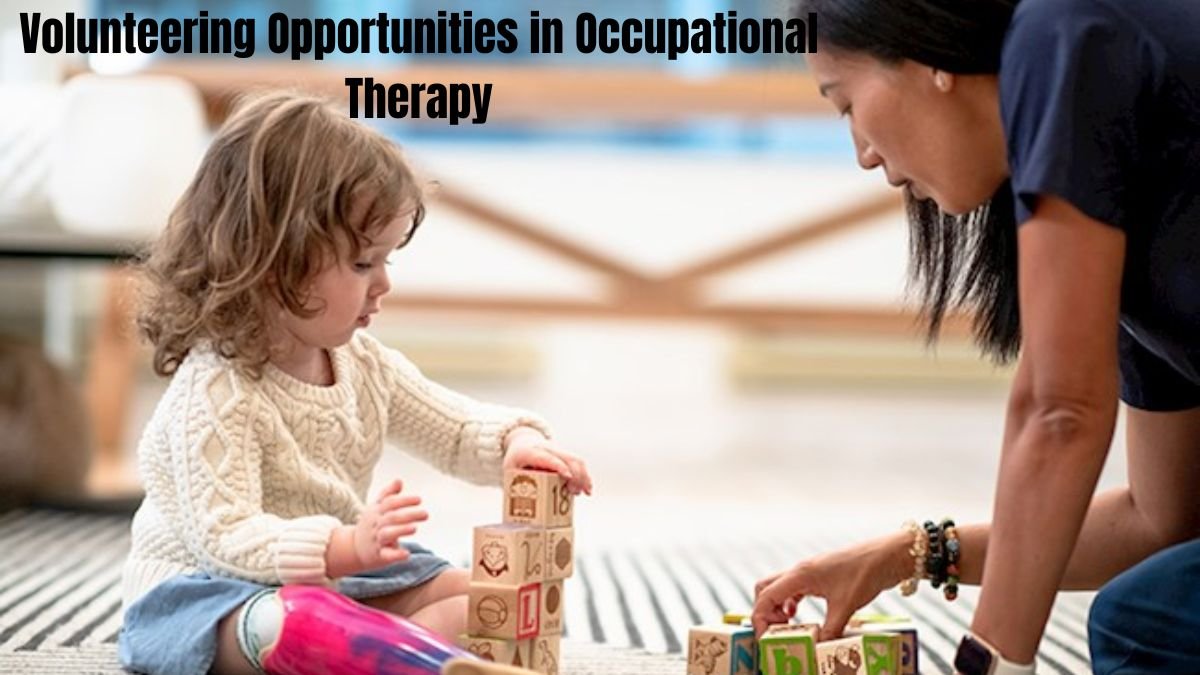If you’re dreaming of a career in healthcare, Occupational Therapy (OT) could be an excellent option for you. It’s not just a career, but a profession where you directly contribute to improving people’s quality of life. Employment opportunities for Occupational Therapy Assistants (OTAs) are constantly growing, as are volunteering opportunities.
OT volunteering is a great way to launch your career, gain practical experience, and strengthen your resume. Whether you’re a student or a new graduate, these opportunities prepare you for the professional world and give you a chance to understand what an OT role looks like in a real-world environment.
In this article, we’ll explore why OT volunteering is important, the key volunteer opportunities available, the skills you can learn, and how to prepare for these opportunities.
Why is volunteering in occupational therapy important?
- Practical Experience – In addition to classroom learning, volunteering connects you with real-world cases and patients.
- Resume Strengthening – Volunteering experience gives you an edge over other candidates in OT interviews.
- Networking Opportunity – Volunteering connects you with experts and mentors who can guide your career.
- Skill Development – Skills like communication, patience, problem-solving, and a customer-focused approach are developed.
- Care for Careers – Volunteering gives you the opportunity to understand which OT field is right for you, such as geriatrics, pediatrics, or rehabilitation.
Geriatric Facilities
Caring for the elderly is a major part of occupational therapy. Volunteering in nursing homes and rehabilitation centers can help you understand the needs of elderly patients.
Skills to be learned:
- Assisting with activities of daily living (ADLs)
- Techniques to help patients regain their abilities
- Creating a safe and comfortable environment
Time Expectation: Typically, a few hours a week and a few months of time may be required.
Qualifications: Most institutions provide training in-house, so no prior qualifications are required.
Hospitals & Rehabilitation Centers
If you want to gain experience in a clinical setting, volunteering at hospitals or specialized rehabilitation centers is the best option.
Skills to be learned:
- Understanding patients’ recovery process
- Teamwork with physicians and OT specialists
- Observation of equipment and therapy procedures
Time Expectation: There may be a more structured schedule, such as 8-10 hours a week.
Schools & Educational Institutions
Occupational therapy also plays a vital role in children’s education and development. OT volunteering can be extremely useful, especially in special education schools.
Skills Learned:
- Promoting children’s learning and motor skills
- Collaborating with teachers and parents
- Creative and interactive therapy techniques
Time Expectations: Typically a few hours in the morning or afternoon, depending on the school schedule.
Community Centers
OT volunteering in community-based programs gives you the opportunity to work with diverse sections of society.
Skills Learned:
- Conducting group therapy sessions
- Health awareness and skill-building activities
- Ability to connect with people of different age groups
Time Expectations: Flexible schedule – from a few hours a week to volunteering on weekends.
Shadowing Programs (OT Shadowing Programs)
Sometimes, simply observing an experienced OT at their workplace can be extremely beneficial.
Skills to be Learned:
- Daily OT Tasks and Responsibilities
- Patient Communication Techniques
- Direct Experience in Various Therapy Settings
Time Expectation: Flexible schedules, from a few weeks to a few months.
How to Prepare for Volunteering?
- Contact local organizations – nursing homes, hospitals, schools, and community centers.
- Prepare a resume and cover letter – Even if it’s volunteering, a professional presentation demonstrates your seriousness.
- Be Flexible – You may get small tasks initially, but they are also learning opportunities.
- Training and Orientation – Organizations often provide training for volunteers; actively participate.
- Build a Network – Learn from OT professionals and build connections for future opportunities.
Conclusion
Volunteering in occupational therapy isn’t just a way to gain experience, it’s also an opportunity to make a positive difference in people’s lives. Whether you choose geriatric care, work in schools, or become part of community programs—each experience makes you more empathetic, skilled, and confident.
If you’re considering a career in OT, volunteering is the best step to take. It not only strengthens your resume but also connects you to the human aspect that makes this profession so special.
